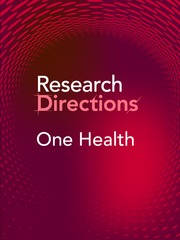No CrossRef data available.
Article contents
Accounting for the Multiple in ‘One Health’ – A pragmatic approach to engage with context based local knowledge and disciplinary perspectives
Published online by Cambridge University Press: 09 September 2025
Abstract
One Health has primarily focused on infectious diseases, without adequately considering the nuances of the environment or biocultural diversity. Its focus has predominantly been on the scientific perspective without taking into account the locally generated Indigenous knowledge or local concerns and consequences of measures adopted in terms of biosecurity and bio-monitoring and their acceptance by the communities concerned. With the recent global policy developments including the One Health High Level Expert Panel (OHHLEP) and the pandemic it appears to have become more broader in scope and more inclusive, yet it continues to face multiple implementation challenges.
Drawing on a set of case studies from different regions this paper seeks to explore the multiple in One Health. It explores how we can better integrate the practical experience of local communities into the One Health approach and how anthropology as a learning approach can contribute to this. By citing specific case studies, the article argues for reckoning the co-created, even shared knowledge of different life forms, within an ecosystem and their dynamic nature. It argues that knowledge networking is crucial to bring out all the available knowledge, and to make it visible and shareable with each other while retaining their own logic and epistemology. Finally, the article points out that there is no one size fits all approach to One Health; it should be co-planned based on contextual realities.
Information
- Type
- Impact Paper
- Information
- Creative Commons
- This is an Open Access article, distributed under the terms of the Creative Commons Attribution-NonCommercial-NoDerivatives licence (http://creativecommons.org/licenses/by-nc-nd/4.0/), which permits non-commercial re-use, distribution, and reproduction in any medium, provided the original work is unaltered and is properly cited. The written permission of Cambridge University Press must be obtained for commercial re-use or in order to create a derivative work.
- Copyright
- © The Author(s), 2025. Published by Cambridge University Press


